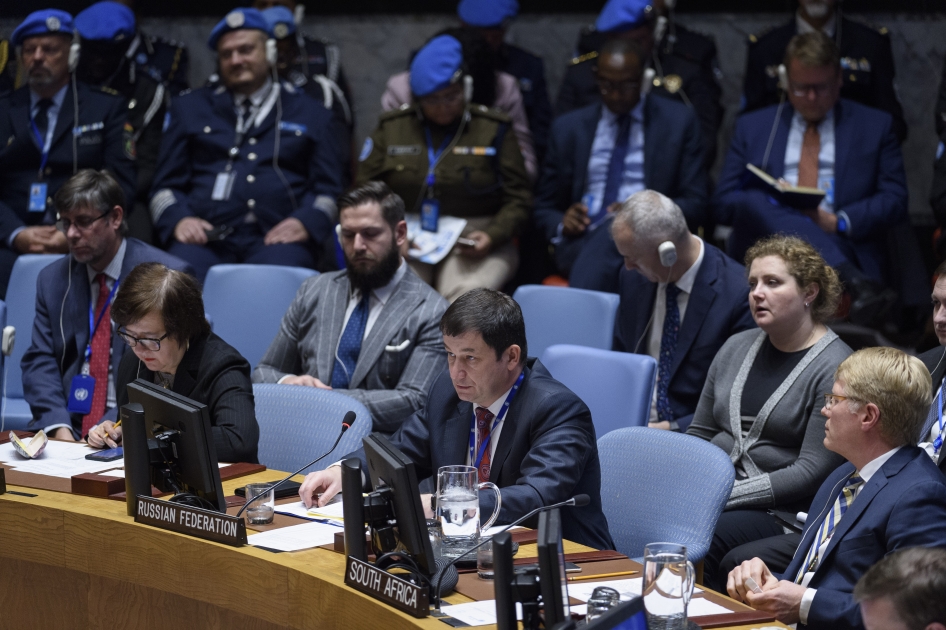Statement by First Deputy Permanent Representative Dmitry Polyanskiy at UN Security Council Meeting on police peacekeepers
Mm. President,
We thank all today’s briefers for the assessments they shared.
Let me also ask the Police Commissioners to convey to all Blue Berets our words of gratitude for their faithful service and challenging work they do to maintain peace and security. We pay tribute to their courage.
It goes without saying that police peacekeepers perform tasks that are crucial for UN peacekeeping activity. Being conductors of peacekeeping efforts, police personnel plays a significant role in providing assistance to national authorities in protecting civil population.
This happens as they do the patrolling, carry out observation, and counter public disturbers, and also as they enhance national capacity of law enforcement bodies in host countries, and help reform security sector. As a result, host countries become more prepared to respond to challenges they encounter.
It is by means of police contingents that the UN helps hosts solve tasks of combatting organized crime, illegal drug and human trafficking, and other threats to security.
Police personnel is a link between population and peacekeeping presence, as well as between population and host governments. It is important that their efforts promote people’s trust to power institutions, build prerequisites for achieving national reconciliation and sustainable peace.
When providing such assistance, police personnel, just like all UN peacekeepers, should strictly follow the mandate they received from the Security Council, observe the UN Charter and basic peacekeeping principles.
Constructive relations with the host are key to effective performance. At this point, it is important to uphold the principle of national ownership, respect sovereignty of host countries, realize what needs they have.
Another important aspect is due account for country specifics. Attempts to apply a universal approach to law enforcement reforms or reforms in the area of rule of law can hardly be effective. Such universal recipes will simply be rejected.
In order to be efficient, police personnel needs due technical, material and human resources. Missions should improve planning and management, avoid unneeded expenses and duplicated efforts. For this purpose, it is important that the Secretariat should consider opinions and recommendations of countries that provide police contingents.
Attempts to promote all kinds of non-UN initiatives and concepts that have not received support of all member states in the Special Committee of UN General Assembly for Peacekeeping (C-34) are counterproductive.
In this regard, we advocate for maintaining constant dialogue between the Security Council, TCCs, and host countries that should touch upon all aspects of activity of peacekeeping operations, i.a. at the stage of planning and elaboration of mandates.
At the same time we believe it unreasonable to entrust police personnel with functions that are uncharacteristic of them, for example those of political or human rights nature. It can distract them from implementing their primary tasks and damage their overall productivity.
We believe it is vital to enhance interaction with regional organizations, i.a. at the police track of the United Nations. We proceed from the need to extend UN support that should strengthen the potential of police peacekeepers from a number of regions, including the African Union, and provide to them assistance in maintaining regional peace and stability.
Mr.President,
Russia, as a contributor of police contingents, continues to increase its input in UN peacekeeping activity and to dispatch personnel possessing relevant skills to the missions. Since 1992, over 500 representatives of Russia’s internal affairs bodies have become police peacekeepers. We are glad that the United Nations on many occasions commended their high professionalism.
We remain committed to obligations we took upon during UN Chiefs of Police Summits (UNCOPS) which resulted in Russia doubling the number of its police peacekeepers.
Today Russian police personnel is involved in South Sudan, Democratic Republic of the Congo, Colombia, Kosovo, and Cyprus. Almost 30% of them are women. Contribution of women to the activity of police on the ground in Russia is also growing.
Specialized center of the Russian Ministry of Internal Affairs that has been certified by the United Nations, carries out training of police peacekeepers, including foreigners on a regular and highly professional basis. Many of the trainees are women. I believe it makes sense to mention that over 30 of the trained experts can speak French.
Ever since 2000 this facility has trained over 1600 Russian officers and over 500 foreign police peacekeepers, including commanding officers from more than 50 countries from across the globe. What is worth being mentioned specifically is a group of women-officers that was trained at the center to become part of police components of UN missions. The total of 40 women from Russia and a number of African countries have completed this training course.
We also stand ready to dispatch experts to participate in the activities of specialized police groups in UN missions. We are interested to consider prospects of participation of Russian police personnel in the projects of the aforementioned groups, i.a. jointly with other countries.
